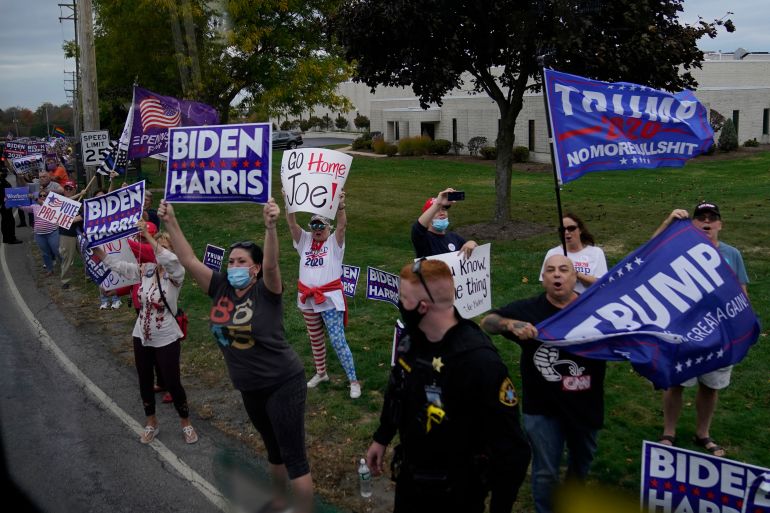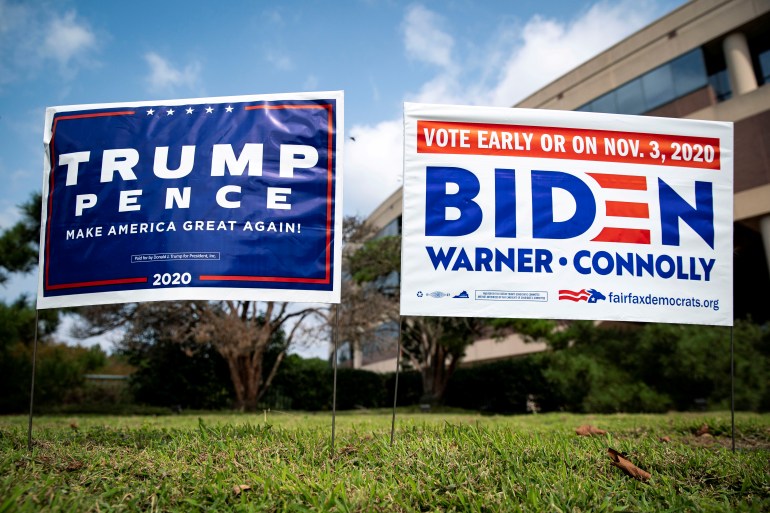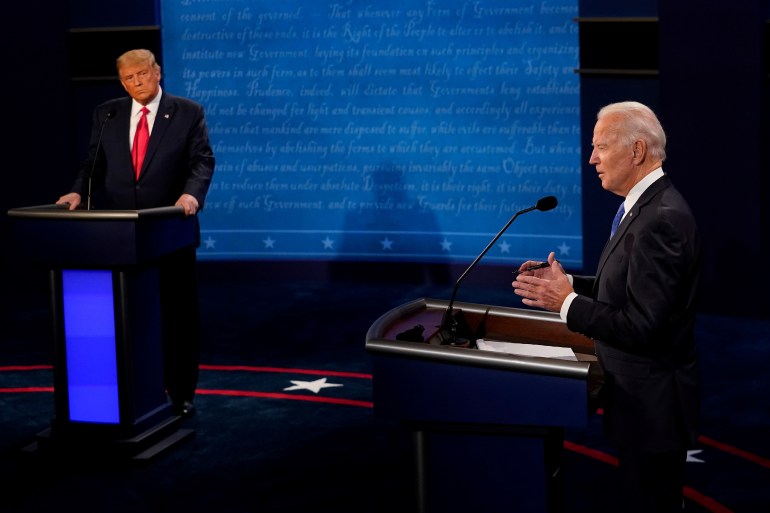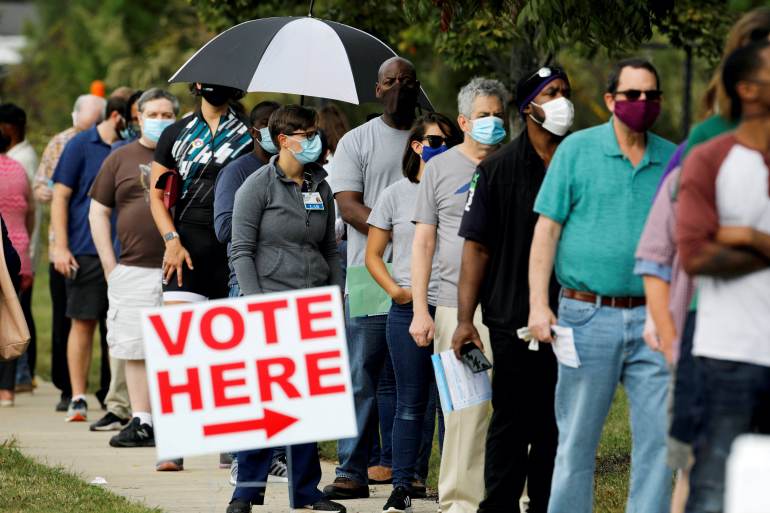Move over, toxic bosses: Politics has US workers wanting to quit
When all of the ballots are tallied and the next United States president is announced, a huge percentage of Americans will feel like they have lost. Virtually or not, they’ll have to go to work the next day.

When cocktails collide with politics, Ruth, a bartender at an upscale hotel in Nashville, Tennessee, finds herself walking the tightrope that divides an increasingly polarised United States.
“My goal is always not to alienate anyone regardless of their politics – and this is very important to me,” the 37-year-old told Al Jazeera, asking that her surname be withheld to protect her privacy.
Keep reading
list of 4 itemsTrump or Biden, whoever wins has a deeply unequal economy to fix
Court battles over counting ballots shape presidential election
Will mail-in voting affect US election night results?
Most of Ruth’s customers are supporters of President Donald Trump, she said, but it’s generally those who are in favour of his Democratic challenger, Joe Biden, who start mixing politics with alcohol.
“The few people I encountered who are Biden supporters are very open about it, and lead in trying to start a conversation about how awful Trump is,” she said. “I usually am very diplomatic and try to just be kind without agreeing and without telling them I don’t agree.”

But Ruth – a Trump supporter – says her boss does not extend her the same courtesy and has been “very passive-aggressive” since learning of her conservative leanings.
“It has made work miserable,” Ruth said. “I have worked with the company 10 years, but her treatment of me after she found out I support Trump makes me want to quit.”
Ruth’s experience is increasingly common. A survey of more than 3,000 American workers published this month by the employee analytics firm Perceptyx found that 42 percent have considered looking for a new job because of the political beliefs of the people with whom they work.
Nearly half – 46 percent – worry that they would be treated differently if they openly disagreed with their managers’ political views.
And it isn’t just worker happiness that’s on the line. Political polarisation in the workplace can also damage the bottom line for businesses.
Economic impact
As the US motors towards Election Day on November 3, political talk is everywhere. Even if people are working remotely, there are political mugs and chatter on Zoom calls, emailed petitions and plenty of social media posts by co-workers to feed the virtual water cooler.
And that can be difficult for workers to navigate.
“Somebody leaving because politics is discussed and it makes them feel uncomfortable – there’s a real tangible economic cost for that turnover in the workforce,” Julie Moore, an attorney and founder of the Massachusetts-based Employment Practices Group, told Al Jazeera.
It has made work miserable. I have worked with the company 10 years, but (my boss's) treatment of me after she found out I support Trump makes me want to quit.
Over the past two decades, Moore has led dozens of trainings with workers each year and conducted more than 200 workplace discrimination and misconduct investigations. She says she has never seen a more polarised political environment.
“Employers really need to be proactive. Because if they’ve got conflict and tension, that leads to lost productivity and all sorts of other tangible and intangible costs,” she said.
Before the coronavirus pandemic, voluntary workforce turnover cost US companies an estimated $1 trillion, a Gallup analysis of US Bureau of Labor Statistics data found. And that cost is felt by small and big firms alike, with the estimated price tag for replacing an individual employee ranging from one-half to two times that person’s annual salary.
High employee turnover also hurts morale, as no one wants to feel like they’re on a sinking ship or trapped in a toxic work environment.
Weary of politics, but still talking about it
While partisan divides have deepened considerably during this election, the fault lines opened up long before the 2020 race.
Maggie McKay was working at a fast-food restaurant in Georgetown, Texas and saving up for college in 2015 as Republican challengers stepped forward to take on Democratic nominee Hillary Clinton.

“Clearly, the dynamic of the country at the time was divided and controversial, and politics were a main part of personal and social lives,” McKay, 21, told Al Jazeera. “I remember working with co-workers who carried knives and would visit work on their days off wearing MAGA hats [Make America Great Again, Trump’s slogan].”
“It was unsettling that they were so open with their beliefs in the workplace,” McKay said. “There would also be conversations about abortion, gay marriage or gun rights, which would cause a clear divide in the people working.”
While politics (along with religion and money) used to be considered a taboo subject at work, Americans also can’t seem to stop talking about it.
Seven out of 10 workers surveyed by Perceptyx said they have talked about politics at work in the last year, and more than 40 percent reported having both a political disagreement at work and a co-worker who has tried to persuade them to change their political party.
Yet 57 percent of those surveyed believe discussing politics at work should be discouraged.
That was the case for McKay and her fast-food restaurant co-workers, who tried to keep politics out of their banter but found “it was impossible to not let opinions be known at some point in time,” she said.
After more than two years on the job, McKay left to attend college in 2017. Now a writing tutor, she said she and her colleagues probably agree politically, but steer clear of it all together because “we are also very aware and weary of bringing politics into the workplace”.
Legal repercussions
It’s not simply a matter of keeping the office mood cordial. In the US, expressing political viewpoints could cost workers their jobs.
While US federal law prohibits workplace discrimination on the basis of race, colour, religion, sex, national origin, age, disability or genetic information, there is no nationwide protection for workers based on their political views or affiliation.
Some jurisdictions – including California, New York and Washington, DC – extend such protections, but in the vast majority of states “it’s employment at will, and an employer can lawfully terminate someone solely based on their political beliefs,” Moore said.
It was unsettling that they were so open with their beliefs in the workplace. There would also be conversations about abortion, gay marriage or gun rights, which would cause a clear divide in the people working.
Contrary to popular belief, the First Amendment doesn’t guarantee free speech at work, said Risa Lieberwitz, a professor of labour and employment law at the School of Industrial and Labor Relations at Cornell University.
That’s because the First Amendment is designed to protect people’s “rights of free speech in relation to the government taking action against you,” not your boss, she told Al Jazeera.
For private-sector employees, Section 7 of the federal National Labor Relations Act extends some protections for workers who invoke politics relating to workplace safety and other labour issues.
But “there may be some political speech that is so attenuated from workplace issues that it would not be protected under the National Labor Relations Act,” said Lieberwitz, adding that this is where collective bargaining agreements negotiated by unions could fill gaps not covered by the law.
Generational divide?
The Perceptyx study also suggests there could be a generational divide at play when it comes to politics and the workplace.
Executives were 1.4 times more likely to say politics shouldn’t be discussed versus individual contributors and staff members, the study found. And tellingly, workers who get most of their news and information about the 2020 election from social media were twice as likely to say it is important for them to work at a company where most people share their political beliefs and attitudes.
You can believe Trump is fabulous. You can believe Trump is the devil. You can believe whatever you want, but check that at the door.
Moore, too, has observed a generational fracture during her workshops. Millennials “have very strong opinions about things”, she said, and view politics and social justice issues differently than her fellow Generation Xers.
“They don’t have the history and the background and experience that someone 20 or 30 years their senior has, so they look at things with a different lens,” said added. “And that’s not casting blame or judgment, it just is what it is.”
Echo chambers
Online and offline echo chambers worry Ruth. She cast her ballot for Trump again on Friday, but hopes people on both sides of the political divide will work harder to find common ground, no matter who wins the White House.
“I would like to see people find 10 things that both sides could absolutely agree on to focus on,” she said.

Ruth wants to see the government improve public education, stay out of foreign wars, break up big tech companies, and ensure people have access to basic medical and dental care.
“I think if we had a chance to talk to the other side, we could fix some things,” she added.
The reality is that after all of the ballots are tallied and the next president is announced, a huge percentage of Americans will feel like they have lost. And virtually or not, they’ll have to go to work the next day.
“You can believe Trump is fabulous. You can believe Trump is the devil,” said Moore. “You can believe whatever you want, but check that at the door.”
